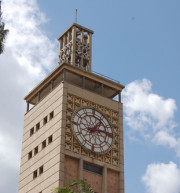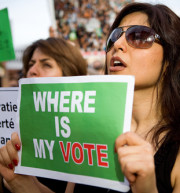
NAIROBI – Special Rapporteur Maina Kiai today announced the launch of FOAA Online!, a web-based legal research tool billed as the world’s most user-friendly compilation of legal arguments on assembly and association rights. The ready-made legal arguments, which are based on international law, standards and principles, will assist lawyers, activists and judges involved in freedom of peaceful assembly and freedom of association (FOAA) cases to uphold the exercise of these rights. FOAA Online! – which is available at https://freeassembly.net/foaa-online – is initially being launched with limited content for beta testing. Additional content will be added regularly, with the complete research tool available expected to be available in late June 2017. The tool is organized by thematic topics and sub-questions in order to direct users as straightforwardly as possible to relevant legal arguments. The set-up allows users to link the facts and incidents in their cases to pertinent legal questions. Themes and questions are focused on the most widespread issues experienced by those exercising their assembly and association rights around the globe. The idea for FOAA Online! grew out of the Special Rapporteur’s litigation project, which was started in 2014 to advance the rights to freedom of peaceful... Continue reading →

(Click for English) GINEBRA – Un grupo de expertos en derechos humanos de las Naciones Unidas condenaron hoy el uso de legislación nacional en Ecuador para disolver la Unión Nacional de Educadores (UNE), la asociación de educadores más importante del país. La UNE, fundada en 1950, fue disuelta debido a la aplicación del Decreto Ejecutivo N. 739 que regula la operación de las organizaciones sociales. “El Decreto Ejecutivo N. 739 establece restricciones demasiado amplias a la libertad de expresión y asociación, lo cual permite a las autoridades disolver asociaciones con base de criterios ambiguos”, señalaron los expertos. “Estamos profundamente preocupados por esta legislación que ciertamente confiere al Ejecutivo poderes discrecionales para suprimir la voz de la sociedad civil en el país”. Los expertos subrayaron que todas las personas deben gozar del derecho a la libertad de asociación reconocido en el derecho internacional y consagrado en el Pacto Internacional de Derechos Civiles y Políticos, ratificado por Ecuador en marzo de 1969. “El derecho a la libertad de asociación es un derecho fundamental, al que sólo se puede aplicar un cantidad limitada de restricciones”, expresó el Relator Especial de la ONU para la libertad asociación, Maina Kiai, al tiempo que... Continue reading →

(En español) GENEVA – A group of United Nations human rights experts today condemned the use of the domestic legislation in Ecuador to dissolve the National Union of Teachers (UNE), the largest teachers trade union in the country. The UNE, founded in 1950, was dissolved through the application of Executive Decree N. 739, which regulates the operation of social organizations. “Executive Decree N. 739 establishes overly broad restrictions to freedom of expression and freedom of association, and allows State authorities to dissolve associations based on ambiguous criteria,” the experts noted. “We are deeply concerned that this legislation indeed provides the executive with discretionary power to suppress the voice of civil society in the country.” The experts stressed that all people should enjoy the right to freedom of association recognized by international law and enshrined in the International Covenant on Civil and Political Rights, which Ecuador ratified in March 1969. “The right to freedom of association is a fundamental right, to which only a very limited number of restrictions may apply,” said the UN Special Rapporteur on the rights to freedom of peaceful assembly and of association, Maina Kiai, while stressing that “the right to freedom of association is at the core of... Continue reading →

GENEVA – Three United Nations human rights experts, including Maina Kiai, today raised alarm at the continuing crackdown on human rights defenders and civil society organisations in Egypt. They warned that many NGOs have been closed down, and human rights defenders have been interrogated by the security forces, subjected to travel bans and had their assets frozen in retaliation for their legitimate and peaceful human rights work. “Egypt is failing to provide a safe and enabling environment for civil society in the country,” the UN experts on human rights defenders, freedom of expression, and freedoms of assembly and association said. “The Government must immediately put an end to all forms of persecution and take effective measures to protect civil society.” The rights experts reiterated their call on the Egyptian authorities to amend Law 84/2002 on Non-Governmental Organizations without delay, which remains in force despite widespread criticism. “The recent attempt to forcibly close the Nadeem Center for Rehabilitation of Victims of Violence demonstrates how Egypt’s NGO Law is being used to obstruct the reporting on human rights issues, such as torture,” explained the experts. The Center was issued with a closing order on 17 February 2016 for publishing reports on torture, which... Continue reading →

GENEVA – A group of United Nations Special Rapporteurs today urged the Government of Kenya to reject legislation that would impose severe restrictions on civil society. “The Bill is an evidence of a growing trend in Africa and elsewhere, whereby governments are trying to exert more control over independent groups using so-called ‘NGO laws,’” the human rights experts warned. The Bill, which was presented to Parliament on 30 October, would amend Kenya’s Public Benefit Organization Act of 2012 and grant the Government sweeping and potentially arbitrary powers to deny registration for such organizations, including NGOs. It would also cap foreign funding at 15% of their total budgets and channel all their funding through a government body, rather than going directly to beneficiary organizations. “The amendments to the regulations of associations contained in the draft law could have profound consequences for civil society organizations in Kenya, including for those involved in human rights work, and could deter individuals from expressing dissenting views,” the UN Special Rapporteur on the situation of human rights defenders, Margaret Sekaggya, stressed. The expert called on the Kenyan authorities to immediately suspend the legislative process of the Bill, and to re-evaluate it in line... Continue reading →

A group of United Nations independent human rights experts today warned that unreasonable limitations placed on the right of Iranian citizens to stand for Presidential office, discrimination against women candidates for elections and ongoing restrictions on freedoms of expression, association and peaceful assembly, constitute a serious violations of rights guaranteed by international law. On 21 May, the Guardian Council, a 12-member body of theologians and jurists, which vets presidential candidates, approved only 8 individuals out of the 686 people registered as candidates for the June 14 presidential elections. Several key political figures and all the 30 female candidates were disqualified, raising serious concerns about the fairness and transparency of the vetting procedures. Several candidates were apparently excluded on the basis of their affiliation with the 2009 post-election protests and their exercise of fundamental human rights, including the rights to freedom of expression, assembly and association. “This mass disqualification including that of women wishing to stand in the presidential elections is discriminatory and violates fundamental right to political participation, and run contrary to the International Covenant on Civil and Political Rights, which Iran has ratified,” said the... Continue reading →

On August 12, 2012, Maina Kiai participated in a discussion panel sponsored by the Woodrow Wilson Center in Washington, DC, entitled "Understanding and Responding to Attacks on Civil Society: The Roles of Politics and Law." The panel also featured Nilda Bullain (International Center for Not-for-Profit Law), Carl Gershman (National Endowment for Democracy) and Kent Hughes (Public Policy Scholar, former director Program on America and the Global Economy). The panel is available via YouTube... Continue reading →

The United Nations Special Rapporteur on the rights to freedom of peaceful assembly and of association, Mr. Maina Kiai, warned that the current public draft of the Law on Associations and Non-Governmental Organizations in Cambodia - if adopted - risks breaching the International Covenant on Civil and Political Rights. “The current draft NGO Law contains a set of problematic provisions, raising concerns over a potential negative impact on Cambodian citizens’ democratic participation in furthering the development of their country,” warned the UN rights expert. Welcoming a recent statement by the Ambassador of Cambodia to the UN Human Rights Council promising “further consultations,” he called on the authorities to review the draft law in open and meaningful discussions with associations and NGOs. Mr. Kiai stressed that the draft law makes registration of associations and NGOs mandatory, not voluntary, and prohibits any activity by unregistered groups. “This constitutes a clear infringement of the right to freedom of association. Having a recognized legal status may confer rights and benefits to organizations such as the ability to open bank accounts, but legal status is not necessary for the enjoyment of the right to freedom of association.” “The draft law excludes refugees, stateless... Continue reading →

In this video, produced by the UN Office of the High Commissioner for Human Rights, Maina Kiai UN Special Rapporteur on the rights to freedom of peaceful assembly and of association, discusses the need to have practical guidelines to these... Continue reading →